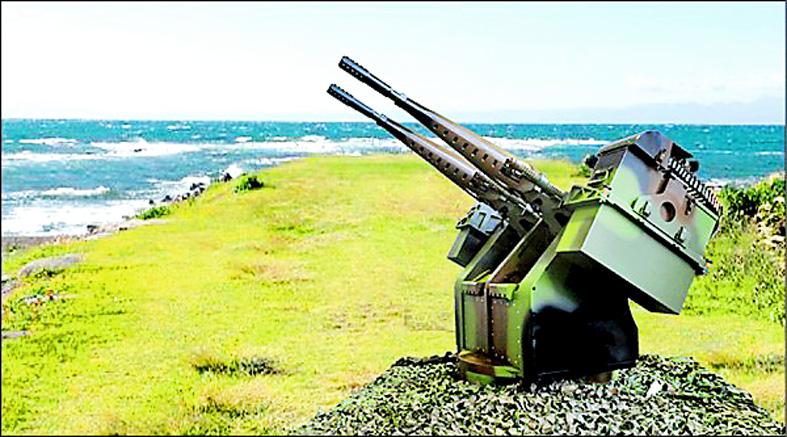The deployment of new short-range automated defense systems on two outlying islands is running ahead of schedule and is to be completed by the end of this year at the latest, the military said in a briefing to lawmakers.
The army and navy have purchased six sets of the short-range weapons systems to be in part deployed on Lienchiang County’s Dongyin Island (東引) and Kinmen County’s Wuchiu Island (烏坵).
The Chinese-language United Daily News (UDN) yesterday reported that the Wuchiu system is expected to be deployed by June, while the system in Dongyin should become operational by the end of this year.

Photo: Screen grab from Chungshan Institute of Science and Technology’s Web site
News of the early deployment schedule came weeks after a Chinese civilian aircraft on Feb. 5 flew near Dongyin in a move widely interpreted as a provocation or test of Taiwan’s combat readiness.
The systems are based on the locally produced T-75 20mm autocannon, with the option of the single-barrel XTR-101 or twin-barrel XTR-102, the Ministry of National Defense said previously of the purchase.
It can be used on land, or mounted on vehicles or ships, as well as remotely controlled to ensure operational safety.
Equipped with image recognition, target locking, ballistic correction and fire-control tracking, the system ensures “fast, fierce, vicious and accurate” firepower, greatly enhancing the military’s short-range defense capabilities, the newspaper quoted the Chungshan Institute of Science and Technology as saying.
The UDN quoted the Navy Command as saying in the report to the Legislative Yuan that testing of four weapons systems was completed by Oct. 8 last year, while construction and electrical installations at the site were completed by December.
Originally scheduled to become operational by the end of this year, the navy said it moved the deployment of the Wuchiu system forward to June.
Construction work on Dongyin was completed last month, the Army Command Headquarters said.
The system is expected to be moved to the island between next month and July, and installed in August and September, the UDN cited the report as saying.
Training would be conducted in September for final checks by October or November, it added.

The US government has signed defense cooperation agreements with Japan and the Philippines to boost the deterrence capabilities of countries in the first island chain, a report by the National Security Bureau (NSB) showed. The main countries on the first island chain include the two nations and Taiwan. The bureau is to present the report at a meeting of the legislature’s Foreign Affairs and National Defense Committee tomorrow. The US military has deployed Typhon missile systems to Japan’s Yamaguchi Prefecture and Zambales province in the Philippines during their joint military exercises. It has also installed NMESIS anti-ship systems in Japan’s Okinawa

‘WIN-WIN’: The Philippines, and central and eastern European countries are important potential drone cooperation partners, Minister of Foreign Affairs Lin Chia-lung said Minister of Foreign Affairs Lin Chia-lung (林佳龍) in an interview published yesterday confirmed that there are joint ventures between Taiwan and Poland in the drone industry. Lin made the remark in an exclusive interview with the Chinese-language Liberty Times (the Taipei Times’ sister paper). The government-backed Taiwan Excellence Drone International Business Opportunities Alliance and the Polish Chamber of Unmanned Systems on Wednesday last week signed a memorandum of understanding in Poland to develop a “non-China” supply chain for drones and work together on key technologies. Asked if Taiwan prioritized Poland among central and eastern European countries in drone collaboration, Lin

NO CONFIDENCE MOTION? The premier said that being toppled by the legislature for defending the Constitution would be a democratic badge of honor for him Premier Cho Jung-tai (卓榮泰) yesterday announced that the Cabinet would not countersign the amendments to the local revenue-sharing law passed by the Legislative Yuan last month. Cho said the decision not to countersign the amendments to the Act Governing the Allocation of Government Revenues and Expenditures (財政收支劃分法) was made in accordance with the Constitution. “The decision aims to safeguard our Constitution,” he said. The Constitution stipulates the president shall, in accordance with law, promulgate laws and issue mandates with the countersignature of the head of the Executive Yuan, or with the countersignatures of both the head of the Executive Yuan and ministers or

BACK TO WORK? Prosecutors said they are considering filing an appeal, while the Hsinchu City Government said it has applied for Ann Kao’s reinstatement as mayor The High Court yesterday found suspended Hsinchu mayor Ann Kao (高虹安) not guilty of embezzling assistant fees, reducing her sentence to six months in prison commutable to a fine from seven years and four months. The verdict acquitted Kao of the corruption charge, but found her guilty of causing a public official to commit document forgery. The High Prosecutors’ Office said it is reviewing the ruling and considering whether to file an appeal. The Taipei District Court in July last year sentenced Kao to seven years and four months in prison, along with a four-year deprivation of civil rights, for contravening the Anti-Corruption